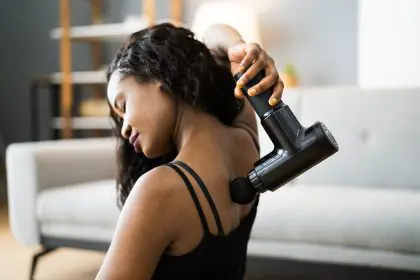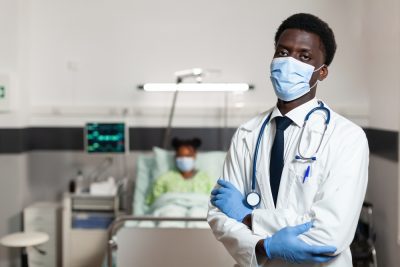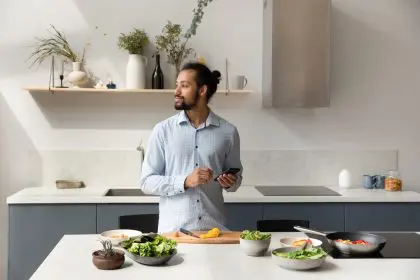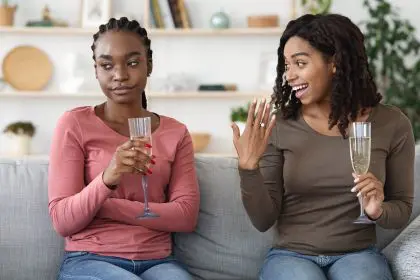Kenny Hampton is the dynamic President of the African American Male Wellness Agency, an organization dedicated to the holistic support of African American men and their families. With initiatives like free health screenings and mental health support, Hampton is driving change and improving lives. His transition from professional sports to an award-winning speaker showcases his resilience and passion for empowering others.
In this interview, Hampton discusses his mission to guide Black men at risk of self-destruction through spiritual and mental health techniques. He emphasizes the importance of vulnerability and brotherhood in overcoming mental health challenges. This conversation touches on the critical topics of mental wellness, addiction, and resilience, offering valuable insights for everyone.
Munson Steed: Hey, everybody! This is Munson Steed, and welcome to Health IQ, where we give you insight on healing, helping, and the opportunities we have in our community. I’m so proud today to have my dear brother. He is a phenomenal individual who is really making and putting a stake in the ground for something near and dear to my heart—the mental health of Black men. Welcome, Kenny Hampton! How are you?
Kenny R. Hampton: Well, good morning. My name is Kenny Hampton. I’m excited to be here. Thanks so much for having me.
MS: You’re a CEO. Tell us about the name and why you even named the organization what you did.
KH: I serve as the president of the African American Male Wellness Agency, the health and wellness arm of the National Center for Urban Solutions based out of Columbus, Ohio. It has been an organization that prides itself on being able to holistically support African American men and their families in some critical areas, with health and wellness being our largest initiative. We provide free health screenings to Black men at our annual Black Men Wellness Days that take place in about seven cities across the country. It serves as an opportunity for us to bring the clinic to the community because we understand that African American men are dying on average at age 67 from preventable diseases. We’re just saying, not on our watch.
What we’ve learned over the years is that it’s not just an issue with Black men not going to the doctor; we’re not actually prioritizing our mental health as well. We’re not having conversations, whether with a therapist or in safe spaces where brothers get together. We’re intentional about bringing talk therapy to the community in the form of a safe space, which we call Real Men, Real Talk. It’s a national initiative, a national campaign, where on average, we have over 1,000 brothers across eight different states having a conversation on a monthly basis, allowing us to talk about things that weigh us down, whether it’s depression, suicidal ideation, anxiety, guilt, or shame.
We’re just telling brothers we’re gonna walk this journey with you. I self-disclose, the CEO of our organization, our for-profit organization NCUS, Mr. John Gregory, self-discloses. It’s an opportunity for men to experience talk therapy and help us navigate life with brothers who are going through it as well.
The power of vulnerability
MS: What is the value of self-disclosure? What is the value of a brother being able to be vulnerable enough to say and share honestly where they are mentally?
KH: The true value is being able to break the chains of depression and anxiety through just having a conversation. Oftentimes, mental wellness or mental health isn’t visible, and what is visible, folks aren’t observing closely enough to see the patterns or flags indicating that something’s not right with one of our fellow brothers. Being able to have a safe space and come together—my self-disclosure of being a former pro athlete, a pastor’s kid, growing up in Detroit with high expectations on my life, and feeling like I fell short of those goals or expectations, even though my life looked like I had a great thing going on—I struggled with an identity crisis.
I didn’t like who I ended up becoming because it wasn’t who I dreamt I would be. Suicidal ideation in men between the ages of 18 to 25 in the African American community is at the highest rate. A lot of it points back to the fact that Black men don’t feel they can be vulnerable, self-disclose, and share. Not knowing that we free ourselves from the chains of depression and anxiety just by having a conversation. Our Real Men, Real Talk allows us to give men the green light to say, “Hey, brother, go ahead and tell us what’s going on with you.”
MS: When you think of mental health, being able to identify triggers and discussing your real feelings—whether it’s depression, anxiety, remorse, or grief—how important is it for brothers to learn through your organization how to label what they’re experiencing?
KS: It’s extremely important to identify, label, and call it what it is. If you’re battling a mental challenge and you’ve lost a loved one—I’ve dealt with grief personally, and most men we interact with have experienced grief. But we only connect grief to the loss of a loved one. You can grieve the loss of a job or a career. There are multiple things that can put us in a state of grief that leaves us paralyzed and stuck. Through partnerships with organizations committed to health equity, we’ve been able to connect our men to local resources and organizations that provide the next step in the healing process for our men.
Every conversation we have nationally includes a Black male therapist, though we don’t always disclose who that person is. Sometimes they end up needing the conversation more than the participants. We’re able to connect them with someone who looks like them, giving them assurance that through this process together, we’ll get them to the next level of healing. We can unlock men from the chains of mental wellness challenges simply by allowing them to be vulnerable and giving them permission to engage in their healing through talk therapy.
Safe spaces for uncomfortable conversations
MS: Thank you for that. Brothers, literally, addiction, alcoholism, the consumption of cocaine, you’ve got the whole music industry talking about drug usage that comes from our celebrities. Men not understanding that their depression is a reason, or related to, or somebody hits a wall, and suddenly they start to consume cocaine when they never did, or drinking wine at 8 in the morning. What do we know about addiction, drug usage, and mental health?
KH: What we do know is that it’s our problem, too. These are things that impact our communities, not just others. These issues, all the way up to opioid overdose, are problems in the Black community. Our organization has a campaign in four different states across the country, declaring that it’s our problem, too. It’s a harm reduction and opioid awareness campaign, working closely with salons, barbers, churches, faith-based organizations, and community-based organizations to get individuals Narcan-trained. This helps us understand that though these issues exist in our community, what are we doing about it?
We’re having community conversations similar to Real Men, Real Talk, providing a safe space for uncomfortable conversations. Every event we have includes food because if you have food, you’ll get folks to come hang out. During these conversations, we’re as real and transparent as possible about the dangers of ignoring the fact that we have loved ones, friends, and community members struggling in these areas. What are we doing to help them get on a path to complete or better wellness? We pride ourselves on the trust built by going door-to-door, doing grassroots outreach, and gorilla marketing, saying, “Hey, I’m coming to you.” This approach has been the X factor in helping folks find themselves and get back in better shape when it comes to issues like opioids.
MS: Lastly, rejection and anger or fear and flight—rejection from a female, rejection from a job. Brothers are rejected on a regular basis, financially rejected, and controlling that narrative so a brother doesn’t say, “I was rejected,” but rather, “the system rejected me.” How can brothers understand those emotions that happen when they don’t have life or are rejected without running to emotions like anger?
KH: What we’ve discovered in our Real Men, Real Talk campaign is that rejection is one of the big giants trying to knock out a lot of our men. It starts at a very young age, in childhood. A lot of our men struggle with the fact that Daddy wasn’t around, growing up in a single-parent home, or Mom making tough decisions because she was in survival mode and left me in unprotected places. We help our brothers identify that these were seasons in their lives that they’ve been able to navigate and overcome. They now have a foundation laid to do something different in how they raise their children and family.
Rejection has served as an opportunity for young men to have a comeback, saying, “I’m going to be different.” Several men across the country share how rejection knocked them back, but they stood up, dusted themselves off, and, through brotherhood, navigated this better than walking alone. Rejection has been an opportunity for Black men to say, “It’s okay to take a loss or get denied,” but that doesn’t mean they can’t continue to press forward. We help brothers move forward, one conversation at a time.
MS: Ladies and gentlemen, I’d like to thank you for having my dear brother, Kenny Hampton, President. I really think you’re a blessing to the community and truly appreciate your leadership, Kenny, in our community. Thank you so much.
KH: Thank you so much for having me.















